Fruits form a healthy and essential part of the human diet. But is it the same for our feline friends? If you have ever asked yourself; can cats eat fruit? Then you are certainly not alone.
Cats are plain carnivores which means they thrive on animal-based food products. However, cats can do with some tasty fruity snacks to help boost their nutrition.
While you can include fruits in your cat’s diet, you must stick to safe fruits. Unfortunately, not all fruits are safe for cats, as some are considered toxic.
Can my cat eat fruit?

Cats lack taste receptors, so they don’t bother about the sweetness of fruits. So your cat might not show interest in that piece of fruit salad.
However, if they do, moderate amounts of fruits can serve as a good substitute for cat treats. You would also need to consider the high sugar content in fruits.
Although fruits are a low-calorie snack, it contains a high amount of sugar which could be a problem for overweight cats. Overweight cats are susceptible to diabetes.
So, can cats eat fruit? Yes. However, you should limit your cat’s consumption of fruits to maintain a healthy diet routine.
Safe fruits you can give your cat
The following are some of the healthiest and safe fruits you can give to your cats:
1. Bananas
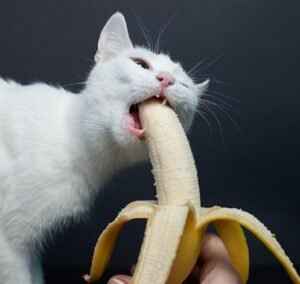 Although bananas are known for their potassium content, they are also an excellent source of magnesium, calcium, fiber, and vitamin C.
Although bananas are known for their potassium content, they are also an excellent source of magnesium, calcium, fiber, and vitamin C.
Bananas offer numerous health benefits to cats, including improved heart health and stronger bones. However, you must note that bananas are high in carbohydrates and sugar and should be consumed in moderation.
2. Apricots
Apricots are highly nutritious. They can provide a rich source of proteins and beta carotene for cats. Beta carotene is an antioxidant that helps the immune system ward off free radical damage.
You must ensure you remove the peel, pit, stem, and leaves before feeding apricots to your cats. The reason is that these parts can be toxic for cats.
3. Apples
Apples can serve as an excellent addition to your cat’s diet routine. Because of their low calorie, apples are beneficial to older cats. Apples are also rich in vitamin A and C, which are critical for healthy bones and tissues.
They can also help reduce allergy symptoms in cats. Apples are also high in quercetin, a natural antioxidant that aids in reducing inflammation and protecting urinary tract health.
4. Mangoes
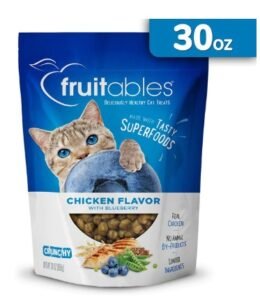
Mangoes are one fruit your cats can enjoy. They are rich in potassium, magnesium, vitamin C, and folate. Other nutrients found in mangoes include niacin, manganese, and thiamine.
Mangoes also contain high amounts of antioxidants, making them healthy for your cats. Remove the skin and pit from the mango before feeding it to your cat.
Although the skin contains fiber and is beneficial to humans, it is tough for your cat’s digestive system to break down.
5. Blueberries
Blueberries are one of the most nutritious fruits out there. They are packed with antioxidants and rich in potassium and vitamin C.
Blueberries are widely dubbed a superfood because of their fantastic benefits for people and animals. For example, the vitamin C content in blueberries can help protect your cat’s urinary health and support night vision.
6. Cranberries
Cranberries are highly nutritious fruits your cat can eat. They are mainly known for supporting urinary health in cats.
The phytochemicals in cranberries prevent bacteria from sticking to the urinary tract wall, making the bacteria easy to flush from the cat’s body.
Cranberries contain high amounts of antioxidants, manganese, and vitamin C. Ensure you feed your cats these red berries when frozen or fresh.
7. Pineapples
Pineapples are very rich in potassium, calcium, and vitamin C. In addition, it contains an anti-inflammatory enzyme called Bromelain that help supports optimal heart functions.
Pineapples have high sugar content, so you must give them to your cat in moderate quantities. Ensure you remove the skin and core before giving it to your cat.
8. Strawberries
Strawberries are rich in fiber and water, making them one succulent fruit cats can eat. They contain reasonable amounts of potassium, magnesium, calcium, and vitamin C.
They also have limited quantities of riboflavin, niacin, and folate. You can mash them and mix them into your cat’s food. But don’t forget to take out the leaves and stem.
9. Raspberries
Raspberries are low in sugar and calories. They are also packed with potassium which supports health functions in cats, and manganese which is essential for healthy bones and teeth.
Although raspberries have low amounts of sugar and calories, they have a trace of xylitol, a naturally occurring sweetener. Xylitol is toxic to cats
10. Watermelon
Watermelons are juicy fruits your cat would love to eat. They contain nearly 92% water, making them an excellent moisture source for your cats.
Since cats do not drink as much water as other pets, such as dogs, watermelons are moisture-rich fruits that keep your cat hydrated.
Watermelons are a good source of vitamin A and B6. Before feeding watermelons to your cats, ensure you remove their seed as they contain traces of cyanide which is harmful to cats.
Safety tips for feeding cats fruits
It would help if you recognized every cat differs in their choice of fruits. So you would have to figure out the particular fruit your cat enjoys.
Before feeding any fruit to your cart, ensure you consult your veterinarian. The following are safety tips to follow when feeding your cat fruits:
- Slowly introduce new food to your cat: Sudden changes to your cat’s diet may disturb the balance of your cat’s digestive system.
- Cut the food into bite-sized chunks; While most fruits may not be complex for cats to chew, large-sized pieces can result in choking.
- Avoid feeding your cats peels and seeds.
- Make fruits a secondary part of your cat’s diet.
Fruits you must avoid when feeding cats
The following fruits could pose serious health risks if consumed by your cats:
- Grapes and raisins; Causes digestive problems in cats
- Cherries: contain cyanide which is toxic to cats
Final Thoughts- Can cats eat fruit?
Can cats eat fruits? Yes. However, it must be a safe fruit and should only be consumed in moderation.
As a rule of thumb, always consult your veterinarian before introducing fruits to your cat’s diet.

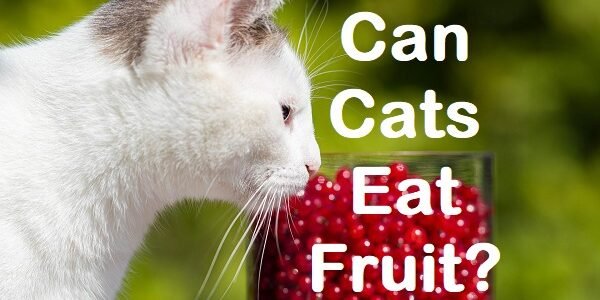


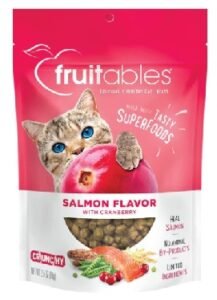
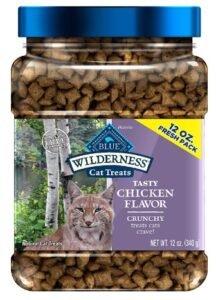 Blue buffalo treats
Blue buffalo treats